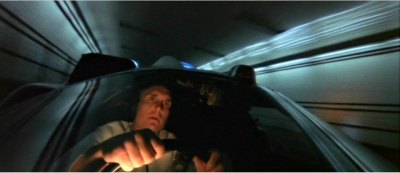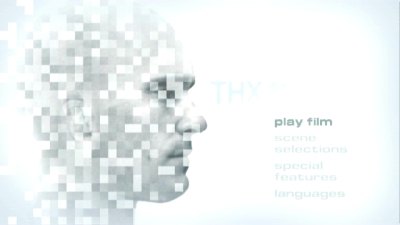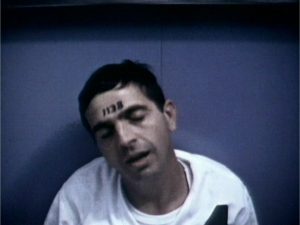| Reviews & Columns |
|
Reviews DVD TV on DVD Blu-ray 4K UHD International DVDs In Theaters Reviews by Studio Video Games Features Collector Series DVDs Easter Egg Database Interviews DVD Talk Radio Feature Articles Columns Anime Talk DVD Savant Horror DVDs The M.O.D. Squad Art House HD Talk Silent DVD
|
DVD Talk Forum |
|
|
| Resources |
|
DVD Price Search Customer Service #'s RCE Info Links |
|
Columns
|
|
|
THX 1138 - The George Lucas Director's Cut (2-Disc Special Edition)

Imagine a world where you're only known by, say, your license plate number. You're not permitted to have a relationship with a member of the opposite sex---in fact, you're not even permitted to have friends---and you're constantly bombarded with messages to buy more things, all while being monitored by a group of people who might be loosely comparable to a government. You can't see outside: no sun, no tress, no stars. Worst of all, you can't escape.
Or can you?
George Lucas' THX 1138 (1971) is one of the most overlooked sci-fi gems in cinematic history, and something of an oddity within the genre itself. Viewers are not presented with the setting of "A Long, Long Time Ago..." or the identity of a clear-cut villain, as the film relies on mood and atmosphere rather than linear storytelling to get its point across.
It becomes fairly evident that the sterile, oppressive tone of THX 1338 is unlike most other science fiction films that came before it---with the only exception being Stanley Kubrick's 2001 (released in 1968, although Lucas' original short film on which THX was based predates 2001 by a year). Regardless of which came first, it's obvious from the opening scenes of THX 1138 that this was a film far ahead of its time. With a cold, bleak atmosphere and an entirely cynical view of the future of society, this is 1984 awash in an endless sea of white walls and shaved heads.

One of these shaved heads belongs to "THX 1138" (Robert Duvall), a man who works in a dangerous, high-stress assembly line. His focus has been steadily decreasing in recent weeks, due to his refusal to take mandatory sedatives (designed to keep "the masses" in line, no doubt). Soon after, he becomes romantically involved with his female roommate LUH 3417 (Maggie McOmie), much to the disdain of those who are watching over the people. He's labeled a criminal, hunted down, and "corrected" (similar to the protagonist in A Clockwork Orange, released the same year). To make a long story short, he's in deep trouble. In reality, though, he's just waking up.
After a brief stay with a few other "criminals" (who, according to the optional Audio Commentary, have been named after a few famous philosophers), an escape is planned. Accompanied by SEN 5241 (Donald Pleasance) and a hologram named SRT (Don Pedro Colley), THX makes his way through an endless sea of white in search of an exit. The three are determined to see what lies outside the city walls...but the film isn't really about the journey at all, or even the destination.

No names. No vacations. No love. No sunny days. No freedom. While these things could possibly exist outside of the prison walls, it was the safety and familiarity of the prison that kept people inside. Director George Lucas compares the situation not to someone trapped inside of a locked room, but someone trapped in a room with an open door---and only fear kept the prisoner from escaping. Regardless of THX's escape attempt or who he meets along the way, the courage to escape is what makes THX 1138 the hero of our story. He was just a regular guy that had the guts to try something different, and sometimes that's all it takes.
Along with director George Lucas and Francis Ford Coppola, a few other guys had the guts to try something different, forming the now-(in)famous American Zoetrope studio in the early 1970s. THX 1138 was the studio's first release...and nearly their last, thanks to a cold reception from Warner Bros. and the domestic box office. Thankfully, Warner Bros. have put the past behind them, as THX 1138 has been given new life on DVD (as well as a theatrical re-release). Besides for a sparkling new technical presentation (and a host of special features not available on the one-disc version), the film has undergone a series of "digital alterations" similar to another more widely-known series of films by Mr. Lucas. Purists have cried foul, and rightly so: this is a substantially different version of the original film, but most of the changes aren't as Earth-shattering as some have implied. In light of listing these changes in their entirety, I've provided a link to a series of comparisons from DavisDVD.com at the end of this review. In the meantime, let's see how this release stacks up, shall we?
Also impressive is the film's new 5.1 Surround remix, although purists may be disappointed that the film's original Mono presentation is not included. Still, it's hard to complain about the quality of the remastering effort, as this is a great-sounding mix that really adds to the atmosphere. While the dialogue is still a little on the "tinny" side---especially the louder tones---the sound effects and music score come through with surprising clarity and punch (especially during the last third of the film). Overall, this is a fine presentation that (once again) makes the viewer forget they're watching a film that was released over 30 years ago.

One of the many highlights of this DVD release is the seamless overall presentation, which is evident even before opening the package. This 2-disc set is housed in an attractive fold-out digipack case with beautifully stark cover artwork that captures the mood of THX 1138. There's a short introduction essay by George Lucas on the inside, as well as a brief scene index. This 88-minute film has been divided into 24 chapters, and no layer change was detected. Menu designs (seen above) are also simply laid out, making for quick and easy navigation overall.
Warner Bros. 2-disc Special Editions are rarely a disappointment when it comes to extras, and THX 1138 is no exception. Disc One starts things off with an Audio Commentary by co-writer / director George Lucas and co-writer / sound designer Walter Murch, who provide much of the technical input on several other bonus features as well. Overall, it tends to favor the themes and philosophy behind the film, spending considerably less time regarding the technical aspects (whether that's good or bad depends on the viewer). While this commentary seems informative and well-rounded on the surface, it proves to repeat itself many times during the viewing of other special features. It's quite obvious that this audio commentary has been created from separate interviews with the two and edited together, which lessens the overall impact of the track. Still, it's great to hear this information firsthand, as it's quite uncommon for a film over three decades old.
The special features continue on Disc One with another feature-length audio option: a sound effects-only track entitled Theatre of Noise, which I believe may be a first for DVD. This proves to be a very unique alternative to your typical isolated score: the harsh, numbing sound effects really affect the overall mood of the story, making for an even more "distant" viewing experience. A third feature-length option is entitled Master Sessions, a series of behind-the-scenes looks at the film's sound design (hosted by Walter Murch). These short vignettes are available via branching technology as the film plays, and can also be selected individually (total running time is 30 minutes). Among other interesting tidbits, Murch discusses the film's unique blending of music and sound effects, as well as the birth of the "lightsaber" sounds from Star Wars.

Disc Two gets things moving with an interesting documentary: A Legacy of Filmmakers: The Early Years of American Zoetrope, narrated by Richard Dreyfuss. It's no secret that the basic premise and philosophy behind THX 1138 was directly influenced by the world around it, and the current state of the film industry was no exception. This 63-minute documentary covers the rise and fall of the struggling young studio during the late 1960s and early 1970s, touching on everything from the influence of Easy Rider to the bitter clash between Warner Bros. and American Zoetrope over the film itself. In all fairness, though, it's great to see Warner Bros. swallow their pride by allowing this documentary to be presented objectively (one might be reminded of the clash between Universal and Terry Gilliam over Brazil, and the wonderful documentary produced for The Criterion Collection). Among other highlights, A Legacy of Filmmakers features short interviews with the likes of Martin Scorsese, Steven Spielberg, and Francis Ford Coppola. Overall, it's a great piece for anyone interested in film history, and as relevant to THX 1138 as any other bonus feature in recent memory.
Next up is another all-new documentary produced for this DVD, entitled Artifact from the Future: The Making of THX 1138 (28 minutes). Although it doesn't shed much information on the technical aspects of the film, it serves as a great retrospective for the cast and crew (a number of which are interviewed). A nice cross-section of promotional material and vintage photographs are also here, helping to establish the film's history in detail. It's not the most in-depth documentary in DVD history, but it's a fine effort for a film that didn't have much support during its initial theatrical release.

Perhaps the film's most valuable extra is Electronic Labyrinth THX 1138 4EB (15 minutes), George Lucas' 1967 student film on which this production was based. While the substantially lower production values make for a much less immersive viewing experience, this is a truly unique opportunity to see a classic film's first steps. The short film (presented in its original 4:3 aspect ratio) shares much with its more expensive counterpart, containing the same overall sense of dread and paranoia (seen above: THX himself, played by Dan Natchsheim). Overall, this one's a must-see for sci-fi history buffs.
Winding things down, we're also given a curious vintage promotional featurette entitled Bald, which takes a look at several actors getting ready to have their heads shorn in the name of cinema. Although this really doesn't shed any light on the film or its lasting impact, it's a nice distraction and a truly unique look at the sacrifices actors make for certain roles. Last but not least, we're treated to a selection of Trailers for the film, including the original and five re-release trailers. On a sidenote, it's really interesting to see the differences between the marketing techniques of 1971 and 2004, and the original trailer is actually the only way to catch a glimpse of the unedited film on this 2-disc release.
Overall, a fine batch of extras, and all have thankfully been presented in anamorphic widescreen when applicable (except a few trailers). Besides for a moderate disappointment with the audio commentary, the only other lacking part of this 2-disc release was any discussion of Lucas' "updating" of the film using CGI effects (see also: Star Wars). While I appreciate Lucas' enthusiasm for keeping his work fresh and visually up-to-date (and, as mentioned before, the majority of these changes really work to the film's advantage), it seems strange to exclude the original from this release entirely. After all, with so much testimony in the included documentaries about the original version being so influential and groundbreaking, why not present it as such (even as an option)?
Even with a few minor nitpicks, this is a near-flawless 2-disc set from Warner Bros. Regardless of your opinion on which version is more effective, this is a film that really set the bar high for science fiction...and did so about 10 years before it really had to. With an absolutely terrific technical presentation that really enhances the viewing experience, THX 1138 has never looked or sounded better...not by a long shot. If you're lucky enough to catch this during its theatrical release, I'd encourage any and all sci-fi fans to check out this early masterpiece by George Lucas...but this DVD is strong enough to stand on its own. Combine these elements with a great set of bonus features, and you've got a rock-solid release to really keep an eye out for. For fans of George Lucas, THX 1138 is anything but an "appetizer" for the upcoming release of Star Wars on DVD; in all honesty, it's an equally impressive effort in all regards. Recommended.

THX 1138 Original Cut vs. Director's Cut Screen Comparisons
|
| Popular Reviews |
| Sponsored Links |
|
|
| Sponsored Links |
|
|
| Release List | Reviews | Shop | Newsletter | Forum | DVD Giveaways | Blu-Ray | Advertise |
|
Copyright 2024 DVDTalk.com All Rights Reserved. Legal Info, Privacy Policy, Terms of Use,
Manage Preferences,
Your Privacy Choices | |||||||












